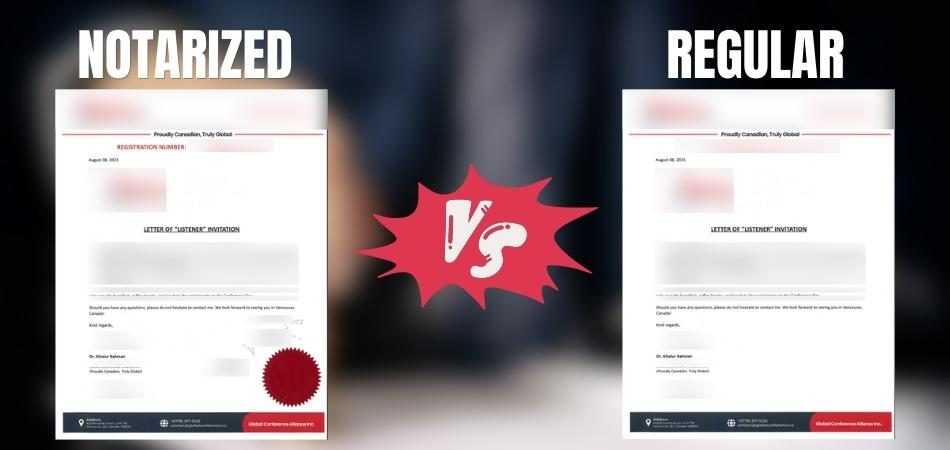An invitation letter can be a powerful document. It shows a personal or official connection between a host and a guest, and it often plays an important role in travel or visa processes. But sometimes, just writing and signing the letter isn’t enough. That’s where a notarized invitation letter comes in. It adds a legal stamp to confirm that the invitation is real. Many people come across the need to understand the relation between the two and may start wondering, What is the difference between a notarized invitation letter and a regular invitation letter?
A regular invitation letter is a simple formal letter that invites someone to visit a person, attend an event, or stay in a country. On the other hand, a notarized invitation letter is the same letter, but it is signed in front of a notary public, who confirms the identity of the signer and adds a notary seal. This adds extra trust and legal value to the document.
Are you curious to know when you really need a notarized letter and when a regular one will work just fine? Then this article explains everything clearly so you can understand the differences, when to use which, and how to get a letter notarized step by step.
What Is the Difference Between a Notarized Invitation Letter and a Regular Invitation Letter?
Invitation letters are important documents for visiting family, attending events, or applying for a visa. Some are simple, while others need extra verification, like notarization. If you’re unsure which one you need, keep reading to understand the exact difference and make the right choice.
Comparison Chart: Notarized vs Regular Invitation Letter
| Aspect | Notarized Invitation Letter | Regular Invitation Letter |
| Purpose and Use | Mainly for official, legal, or immigration purposes. Assures authorities that host’s details are verified. | Mostly for informal or private purposes like family visits, ceremonies, or short stays. |
| Verification Process | Requires the host to meet a licensed notary. Notary checks ID, then signs and stamps the document. | No external verification required. Host writes and signs independently. Relies on trust. |
| Legal Value | Holds strong legal recognition. It can serve as supporting evidence in immigration or visa cases. | Limited legal strength. May support applications, but not accepted in complex reviews. |
| Cost and Effort | Involves extra steps and notary fees. Requires scheduling time with a notary. | No fees. Only requires time to write and sign. Simple and fast process. |
| Acceptance by Authorities | Widely accepted by embassies requiring strong verification. Often mandatory in strict immigration processes. | Sometimes accepted in less strict cases. Depends on the embassy and country rules. |
| Risk of Rejection | Lower rejection risk. Verified identity and a notary seal add credibility and trust. | Higher rejection risk. It may be doubted due to a lack of official verification. |
Purpose and Use
Official visa applications frequently require a notary invitation letter. It assures authorities that the host’s details are verified. This type of letter is mainly used for legal, governmental, or immigration purposes. Its role is to support serious documentation.
Regular invitation letters are typically used for informal or private purposes. Families may write it to invite loved ones. It can also be used for friendly gatherings, ceremonies, or short visits. Its role is often informal.
Verification Process
A notarized invitation letter requires the host to meet a licensed notary. The notary confirms valid identification before proceeding further. Once confirmed, the notary signs and stamps the document. This process confirms the signer’s identity and signature, not the letter’s facts.
Such verification is not necessary for a standard invitation letter. The host simply writes and signs the letter independently. No external official is involved in its preparation. Its trust relies only on the host’s reputation.
Legal Value
In official affairs, a notarized invitation letter has strong legal recognition. Authorities consider it reliable because a notary authenticated the signature. It can be used as supporting evidence in visa and immigration applications. The letter provides significant legal trust and reliability.
A regular invitation letter lacks such strong legal recognition. While it can still support an application, it carries weaker proof. Immigration authorities may accept it only in simple cases. It does not provide firm legal backing for complex reviews.
Cost and Effort
Notary fees vary by country and region. In many places, notarizing an invitation letter costs between $10 and $50 USD or CAD. Mobile or online notary services may charge higher fees for convenience. Getting an invitation letter notarized requires additional steps and costs. The host must pay a notary fee for services. It also requires scheduling time to visit the notary. Preparation takes more effort compared to a regular letter.
The only expense of a standard invitation letter is time. The host writes it without seeking professional services or official help. There are no additional fees required for completion. The process is quick, direct, and much simpler overall.
Acceptance by Authorities
A notarized invitation letter is widely accepted by embassies requiring strong verification. Officials trust the added notary stamp for authentication. This type is mandatory in several countries’ immigration processes. Acceptance is generally much higher for notarized letters.
For private travel, a regular invitation letter may occasionally be accepted. Some embassies consider it sufficient when rules are less strict. It works where basic invitation details are enough. However, acceptance depends on specific country and embassy requirements.
Risk of Rejection
Rejection rates are decreased with a notarized invitation letter. Officials recognize the notary’s involvement as added proof of authenticity. Verified signatures make authorities more confident during reviews. This lowers the risk for travelers using such letters.
A regular invitation letter has a higher chance of rejection. Immigration officers may question its reliability without notarization. This increases doubts about the host’s identity. Applications may fail when rules require strict supporting documents.
Why Do Some Authorities Require a Notarized Invitation Letter?
Invitation letters are very important when someone plans to visit another country. Some letters are accepted easily, while others need extra proof. This is where notarized invitation letters come in, and knowing why authorities ask for them is useful. Keep reading to see the reasons behind it.
Identity Check
Authorities want to be sure that the host is a real person. A notarized letter proves the host’s identity. The notary checks official identification documents before signing. This extra step gives officers confidence that the letter is genuine.
Preventing Fraud
Fake documents are a big problem in travel cases. A notarized letter makes it harder for anyone to create false details. The notary verifies the signer in person before approving the document. This helps reduce the chances of fraud.
Legal Support
Some visa offices prefer documents that carry legal weight. A notarized letter acts as stronger support compared to a regular one. It becomes an official record of the host’s statement. This gives authorities a legal base to rely on.
Embassy Rules
Different embassies follow their own rules for documents. Some clearly ask for notarized letters in their visa checklist. Applicants must follow those requirements to avoid rejection. Having a notarized letter ensures you meet embassy instructions exactly.
Clear Responsibility
A notarized invitation letter shows the host is serious. Signing before a notary means they accept responsibility for the guest. This gives officers confidence that the host will support their visitor. It creates a clear link of accountability.
Extra Assurance
Visa officers deal with many applications every day. A notarized letter saves them time by proving authenticity quickly. It shows the document is already checked for identity. This extra assurance can make their review smoother and faster.
When Do You Need a Notarized Invitation Letter Instead of a Regular One?
Invitation letters are often needed during visa applications or official visits. In some cases, just a signed letter is fine, but sometimes that’s not enough. Keep reading to find out when a notarized invitation letter becomes important:
Embassy-Specific Rule
Every embassy has its own rules for visa documents. Some embassies clearly ask for notarized invitation letters to accept an application. If that rule is skipped, they might reject the request. So, it’s always important to follow their exact instruction.
Visiting on Sponsorship
If the host is covering travel, stay, or daily costs, notarization may be needed. It shows that the host takes full responsibility. Embassies often prefer notarized proof in sponsored trips. This helps prove the visit is well-supported and trusted.
Hosting Non-Family
When inviting a friend or someone not closely related, authorities may need stronger proof. A notarized letter confirms the invitation is real. This helps stop fake or unclear relationships. It’s useful when no family tie can be shown easily.
Legal or Court Visits
Some visits involve court hearings or legal matters. In such cases, a notarized letter may be required. It confirms the visitor is coming for serious official reasons. Legal trips often need stronger documents than casual travel.
Urgent Medical Visits
Medical emergencies or health-based travel sometimes need notarized support. Embassies want to be sure the case is real. A notarized letter adds trust and avoids delay. It also shows the host is prepared to help during the stay.
First-Time Travelers
For someone traveling abroad for the first time, extra documents are often required. A notarized letter helps build trust with immigration officers. It shows the trip is planned and supported properly. This can ease doubts during the visa process.
Countries With Strict Checks
Some countries have very strict visa rules. Their embassies want more official paperwork. A notarized letter becomes helpful in such cases. It shows that the visit is genuine and properly arranged.
For Conference and Business Visitors: Which Letter Is Better?
Many applicants worry about whether they need a notarized invitation letter. For most conference and business visits, this is not required. Understanding the difference helps avoid stress and delays.
For international conference attendees, a regular invitation letter from the organizer is usually enough. Embassies accept official letters printed on conference letterhead. These letters should include event dates, venue, and your registration confirmation. This clearly shows the purpose of travel and temporary stay.
A notarized invitation letter is rarely needed for conferences. It is mostly used when a private individual invites you and offers accommodation or financial support. In such cases, notarization helps prove the host’s identity and responsibility.
You may be asked for a notarized letter only in special situations. This includes when the embassy clearly requests it, when your host is a private person, or when you have past visa refusals that require extra proof.
In most cases, conference organizers do not issue notarized letters. A clear, official invitation with proof of registration is usually enough for visa purposes. Always check embassy instructions, but do not assume notarization is required.
Country-Specific Rules for Invitation Letters (Canada, USA, UK)
Invitation letter requirements change by country, and knowing this helps avoid mistakes.
Canada
For Canadian visas, especially visitor visas and family sponsorship cases, notarized invitation letters are often recommended. Immigration, Refugees and Citizenship Canada (IRCC) may also expect proof of the host’s legal status, such as a PR card or citizenship document.
United States
The U.S. generally does not require invitation letters to be notarized. In many cases, a regular invitation letter is enough, and sometimes an invitation letter is not required at all. U.S. embassies focus more on the applicant’s own documents and travel intent.
United Kingdom and Schengen Countries
Some UK and Schengen countries may ask for notarized or officially certified invitation letters, especially when the host is sponsoring accommodation or expenses. Embassy checklists should always be reviewed before applying.
Always check the embassy website of the destination country before deciding which letter to use.
What to Include in Any Invitation Letter?
Invitation letters may look simple, but they should always include clear details to be useful and accepted by authorities. Leaving out important parts can cause confusion or even rejection. Let’s go through the main things every invitation letter should contain.
- Host Information
- Guest Information
- Relationship Details
- Purpose of Visit
- Visit Duration
- Accommodation Details
- Financial Support
- Signature and Date
Host Information
Start with the full name of the person inviting the guest. Add their date of birth, full home address, and phone number. Including email can also help if officers need quick contact. These details prove the host is a real person.
Proof of Host’s Legal Status
In many visa cases, the host should attach proof of their legal status in the country. This may include a passport copy, permanent residence card, visa permit, or national ID. This is especially important for notarized invitation letters.
Guest Information
The guest’s name must match exactly with their passport. Add date of birth, nationality, and complete address. Passport number is often included for accuracy. These details help officers connect the invitation with the correct traveler.
Relationship Details
Explain how the host and guest know each other. Mention family ties, friendship, business partnership, or other connections. Adding how long they’ve known each other makes the relationship stronger. Clear relationship details make the letter look more genuine.
Purpose of Visit
Describe why the guest is visiting in simple words. It could be tourism, attending a family event, or business work. Specific details, like “attending a wedding” or “holiday trip,” add clarity. A clear purpose helps authorities trust the invitation.
Visit Duration
Always write how long the visit will last. Mention exact arrival and departure dates instead of vague timeframes. Include the planned length of stay, like two weeks or three months. This helps immigration officers know the trip is well-planned.
Accommodation Details
State clearly where the guest will live during their stay. If they are staying with the host, provide the full address. If it’s a hotel, mention the booking details. Clear accommodation information shows that living arrangements are already secured.
Financial Support
Mention who will cover the expenses during the trip. The host may promise to pay for food, housing, or travel. If the guest is self-funded, mention that too. Financial details prove the visit is properly arranged and affordable.
Signature and Date
End the letter with the host’s handwritten signature. Include the date when the letter was signed. Adding the host’s full printed name under the signature makes it professional. A letter without a signature or date looks incomplete.
How to Get an Invitation Letter Notarized?
Notarizing an invitation letter may sound difficult at first, but the process is actually simple if you follow the right steps. It’s done to add more trust and official weight to the letter. Let’s go step by step to see how you can get it done.
Write the Letter
Start by drafting a complete invitation letter that includes all important details. Write the host’s full name, address, and contact number. Add the guest’s details, travel dates, and the purpose of the visit. A clear and well-structured letter makes notarization smoother.
Collect Your ID
Before meeting the notary, gather proper identification. Most notaries accept a valid passport, driver’s license, or government-issued ID card. The name on your ID should match the name in the letter. Without matching and valid identification, the notary will refuse the service.
Find a Notary
Search for a licensed notary in your local area. They can usually be found in banks, law firms, courthouses, or business centers. Many areas also provide mobile notaries who come to your home or workplace. In some regions, online notary services are available too.
Meet the Notary
Take your letter and ID to the notary’s office. Do not sign the letter until you are in front of the notary. They will review your identification, check the letter, and watch you sign it. This step proves the signature truly belongs to you.
Pay the Fee
Notarization is a paid service, though the fee is usually modest. The price can vary depending on the country or region. Mobile or online notaries may charge higher fees for convenience. Always ask the notary about the cost before the appointment.
Receive the Seal
After verification, the notary will place their seal or stamp on the letter. This seal proves your signature has been confirmed legally. The notarized letter now carries more trust and weight in official processes. Immigration officers often prefer notarized documents for stronger proof.
Keep Extra Copies
Once the notarization is complete, make extra copies of the letter. Keep one original for official use and share copies with the guest. Scanned copies can also be helpful during travel or embassy requests. Extra copies prevent delays if one is misplaced.
Samples of Notarized and Regular Invitation Letters
Invitation letters may be written for many reasons, but their format stays mostly the same. Whether it’s for family, friends, or business, the main content doesn’t change much. Below are sample letters in both regular and notarized formats.
Samples of Regular Invitation Letters
Sample 1 – Family Visit
[Your Full Name]
[Your Address]
[City, State, ZIP]
[Phone / Email]Date: [DD/MM/YYYY]
To Whom It May Concern,
I, [Your Full Name], residing at [Full Address], would like to invite my [relationship, e.g., brother, sister, friend], [Guest’s Full Name], who lives at [Guest’s Address], to visit me in [Country]. The purpose of the visit is to spend family time together and celebrate [occasion].
The planned visit will be from [start date] to [end date]. During this time, [Guest’s Name] will stay at my residence, and I will cover accommodation and living costs.
Sincerely,
[Signature]
[Full Name]
Sample 2 – Tourism
[Your Information]
Date: [DD/MM/YYYY]
Dear Visa Officer,
I, [Your Full Name], currently living at [Your Address], would like to invite [Guest’s Full Name] to visit me in [City, Country] for tourism. The purpose of the visit is sightseeing, cultural experiences, and exploring famous landmarks.
The visit is planned for [start date] to [end date]. I will provide accommodation at my residence and assist with local travel.
Kind regards,
[Signature]
[Full Name]
Sample 3 – Business Visit
[Your Information]
Date: [DD/MM/YYYY]
To Whom It May Concern,
This letter is to formally invite [Guest’s Full Name], from [Guest’s Company], to visit our office at [Company Name], [Company Address]. The purpose is to attend business meetings and explore cooperation opportunities.
The planned visit is scheduled from [start date] to [end date]. Our company will provide accommodation and cover daily expenses during the stay.
Sincerely,
[Signature]
[Full Name]
[Position, Company Name]
Samples of Notarized Invitation Letters
Sample 1 – Family Visit
[Your Full Name]
[Your Address]
[City, State, ZIP]
[Phone / Email]Date: [DD/MM/YYYY]
To Whom It May Concern,
I, [Your Full Name], residing at [Full Address], would like to invite my [relationship, e.g., brother, sister, friend], [Guest’s Full Name], who lives at [Guest’s Address], to visit me in [Country]. The purpose of the visit is to spend family time together and celebrate [occasion].
The planned visit will be from [start date] to [end date]. During this time, [Guest’s Name] will stay at my residence, and I will cover accommodation and living costs.
Sincerely,
[Signature]
[Full Name][Seal/Stamp of Notary Public]
[Notary Public Full Name, Signature, and Commission Number]
Sample 2 – Tourism
[Your Information]
Date: [DD/MM/YYYY]
Dear Visa Officer,
I, [Your Full Name], currently living at [Your Address], would like to invite [Guest’s Full Name] to visit me in [City, Country] for tourism. The purpose of the visit is sightseeing, cultural experiences, and exploring famous landmarks.
The visit is planned for [start date] to [end date]. I will provide accommodation at my residence and assist with local travel.
Kind regards,
[Signature]
[Full Name][Seal/Stamp of Notary Public]
[Notary Public Full Name, Signature, and Commission Number]
Sample 3 – Business Visit
[Your Information]
Date: [DD/MM/YYYY]
To Whom It May Concern,
This letter is to formally invite [Guest’s Full Name], from [Guest’s Company], to visit our office at [Company Name], [Company Address]. The purpose is to attend business meetings and explore cooperation opportunities.
The planned visit is scheduled from [start date] to [end date]. Our company will provide accommodation and cover daily expenses during the stay.
Sincerely,
[Signature]
[Full Name]
[Position, Company Name][Seal/Stamp of Notary Public]
[Notary Public Full Name, Signature, and Commission Number]
Do Notarized Invitation Letters or Regular Invitation Letter Guarantee Visa Approval?
No, notarized invitation letters or regular invitation letters do not guarantee visa approval. Immigration officers review many factors before making decisions. These factors include financial stability, travel history, security checks, and the overall purpose of the applicant’s visit.
A notarized invitation letter strengthens an application by proving the host’s identity and adding legal weight. Regular invitation letters also help by explaining the relationship and reason for the visit. However, neither document alone ensures that the visa will be granted.
Visa approval depends on the applicant meeting all the country’s entry requirements. Consulates and embassies evaluate supporting documents, background information, and provided details carefully. Both notarized and regular letters act as supportive evidence but cannot replace full compliance with immigration rules.
Does a Notarized Invitation Letter Make the Host Legally Responsible?
In most cases, notarizing an invitation letter does not make the host legally responsible for the guest’s actions, debts, or legal issues. The notary only verifies the identity and signature of the host, not future behavior.
However, if the letter includes financial sponsorship promises, authorities may expect supporting documents. Hosts should always write only what they can realistically support.
Common Mistakes to Avoid With Invitation Letters
Invitation letters may seem simple to prepare, but many people still make errors that weaken the document. These errors can slow down the process or even cause refusal. Learning about them helps in preparing a stronger letter. Let’s explore these mistakes now.
Overly Long Explanations
Adding too many personal stories or unnecessary details makes the letter hard to read. Officials want facts, not long background information. When a letter looks more like a diary, it may be ignored. Keeping information short and clear works best.
Using Incorrect Format
Some people forget that invitation letters should follow a professional format. Writing it casually, like an email, looks unprofessional. Officials may view such letters as careless or incomplete. Using a proper letter style shows respect and seriousness.
Not Matching Travel Plans
The letter should match travel bookings and schedules. If flight tickets say one date but the letter says another, it causes doubt. Such mismatches make officers question the application. Always review both documents together to keep them consistent.
Leaving Out Contact Info
Sometimes, hosts forget to add their phone number or email. Without it, officers cannot confirm details if questions come up. This can delay or even stop the visa process. A simple contact line solves this issue.
Mixing Languages
A letter written in two languages may confuse the reader. Unless officially allowed, it’s better to use one clear language. If translation is needed, attach a certified translated copy. This avoids miscommunication and makes the letter professional.
Overpromising Support
Saying you will cover every cost without proof can hurt the case. Officers may feel the promise is unrealistic. Always match promises with supporting evidence, like bank statements. Honest details make the application stronger.
Sending Copies Instead of Originals
Some embassies require the original signed invitation letter, not a scanned version. Sending a copy may look careless or incomplete. Always read embassy guidelines before submission. Submitting the correct form avoids delays or rejection.
Frequently Asked Questions
Invitation letters often leave people with many small but confusing doubts. Some wonder about the exact process, while others focus on rules. These FAQs bring clear answers so readers can understand everything without worrying about missing important details.
Can an Invitation Letter Be Notarized Online?
Yes, in some countries, online notarization is legal and accepted. This means the host can meet a notary through a video call. The notary then checks the ID online and provides a digital seal. However, not every embassy accepts online notarization, so checking local rules is important.
Is an Invitation Letter Enough Without Other Documents?
No, an invitation letter alone is not usually enough for visa approval. Immigration officers want to see other supporting documents as well. These may include bank statements, proof of employment, or return tickets. The invitation letter works as supporting evidence, not the main proof.
Why Do Authorities Sometimes Reject Invitation Letters?
Authorities may reject letters with wrong details, missing documents, or unclear travel reasons. They need full trust in the letter’s accuracy. If something looks false or confusing, rejection is possible. Proper documents always reduce such risks.
Do Invitation Letters Expire?
Yes, invitation letters are valid only for the time frame mentioned in them. If dates change, a new letter is often needed. Embassies want to see updated and accurate details. An outdated letter may cause delays or even rejection.
Who Can Act as a Host in an Invitation Letter?
A host can be a family member, a friend, a business partner, or even an institution. The most important requirement is that the host lives legally in the country. They should have a valid address and documents to prove their residence.
Can a Company Issue an Invitation Letter?
Yes, companies often issue invitation letters for employees, business partners, or clients. These letters are written on company letterhead with official signatures and stamps. Such letters are common for business trips, meetings, or training programs. They may also require notarization for legal strength.
Which Countries Commonly Ask for Notarized Letters?
Some countries, like Canada, Spain, and Germany, often ask for notarized invitation letters. These countries take legal verification very seriously. It helps them confirm that the host is real and available. Not all countries follow this strict requirement.
Conclusion
Travel plans often feel exciting, but paperwork like invitation letters can decide whether everything goes smoothly or gets delayed. Knowing the right type of letter helps avoid unnecessary stress and confusion during the visa process.
A regular invitation letter works well for casual visits, while a notarized one carries more weight in official cases. This brings us back to the main question many people ask: What is the difference between a notarized invitation letter and a regular invitation letter? The answer is simple: both serve the same purpose, but notarization adds legal proof and stronger trust.
When preparing your letter, think about your purpose, the embassy’s rules, and the guest’s situation. Choosing the correct version saves time, builds confidence, and makes the entire process much easier for both the host and the visitor.










